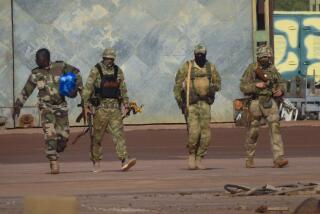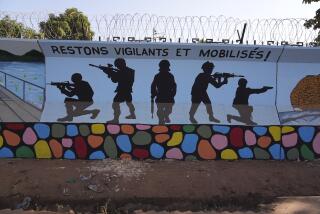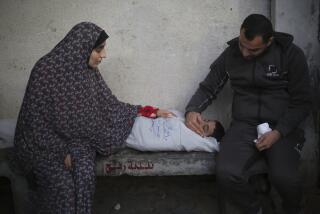Algeria raid puts a lawless region in the spotlight
CAIRO — The offensive by Algerian soldiers to free hostages at a natural gas complex has refocused world attention on the dangers of a lawless desert region bristling with gunrunners, smugglers and a virulent strain of Islamic ideology.
Coming days after French airstrikes on Islamist militants in neighboring Mali, the raid Thursday killed or wounded many militants and an unspecified number of Western and Algerian hostages, the Algerian government said. Officials in Algiers, the capital, said late in the evening that they had wrapped up the assault on the compound near the Algerian-Libyan border deep in the Sahara desert.
“The operation resulted in the neutralization of a large number of terrorists and the freeing of a considerable number of hostages,” Communications Minister Mohamed Said Belaid told state-run media. “Unfortunately we deplore also the death of some.... We do not have final numbers.”
The Algerian news agency said 45 hostages, including Americans, escaped the site. But later Algerian media reports indicated that only four to six foreign hostages were freed and that there were a number of “victims.”
A Mauritanian news organization quoting a militant spokesman suggested that gunfire from Algerian military helicopters struck two vehicles attempting to flee the compound, killing 35 foreigners and 15 kidnappers, including the militant group’s commander. The differing accounts were impossible to confirm or reconcile and epitomized a chaotic day that appeared to raise questions from Western leaders over the operation’s planning.
In addition to as many as seven Americans, captives included Algerians, Britons, Japanese, Norwegians and other foreigners.
The army raid marked a surprising twist in a drama that had raised fears of a long siege and highlighted the revived Islamist extremism in the region.
To the west of Algeria lies Mali, where Islamist rebels have intensified their fight in recent days to overthrow the government, prompting French military action backed by American logistical support. To the east lie Tunisia and Libya, where revolutions beginning in 2010 overthrew President Zine el Abidine ben Ali in Tunis and Moammar Kadafi in Tripoli.
Since then, militant and radical Islamist groups, including Algeria’s Al Qaeda in the Islamic Maghreb, have become more emboldened amid the political upheaval of new governments. Western countries have grown increasingly concerned that North Africa could become a seedbed for international terrorism.
The hostage drama unfolded in a gas field known as In Amenas, close to the border with Libya, a country of particular concern to Algeria. Extremists and weapons looted from Kadafi’s military and police have flowed across the border for months.
Farther east, Egyptian authorities are concerned that militants from Algeria and Libya have joined terrorist cells in the Sinai Peninsula along the Israeli border.
It was the strife in Mali, however, that apparently led to the militant takeover of the Western-run gas compound Wednesday. The Algerian militants, who belonged to an Al Qaeda-linked group called the Signed-in-Blood Battalion, said they were acting in retaliation for French airstrikes against advancing Malian rebels. They reportedly threatened to blow up the plant if Algerian commandos attempted to free the hostages.
After the compound was seized by the militants, hundreds of Algerian soldiers firing warning shots ringed the remote compound as helicopters skimmed overhead. The militants asked for safe passage to Libya, with the hostages accompanying them. Algerian officials, who over the years have cracked down harshly on Islamic radicals, said they would not consider such requests.
“The authorities do not negotiate, no negotiations,” Interior Minister Daho Ould Kabila said on state television. “We have received their demands, but we didn’t respond to them.”
The Algerian government was under pressure from the U.S., Britain and other countries whose nationals were taken hostage. But the raid caught some by surprise and appeared to irritate some Western leaders. British Prime Minister David Cameron’s office said he would have preferred to have been told in advance of the operation.
“I think we should be prepared for the possibility of further bad news, very difficult news in this extremely difficult situation,” Cameron said.
The State Department declined to provide details of the Algerian offensive, saying it could endanger hostages, some of whom were reportedly forced to wear explosives-laden belts.
White House spokesman Jay Carney told reporters, “We are certainly concerned about reports of loss of life and we are seeking clarity from the government of Algeria.”
The Algerians are “used to fighting terrorism, in their own, quite hard way,” said Mathieu Guidere, a professor of “Islamology” at the University of Toulouse in France and author of “The New Terrorists.” “It’s likely the deaths at the petrol base were as a result of the assault by the Algerian security forces.”
Reports have suggested that as many as 41 foreigners were being held along with scores of Algerians. An Irishman who was among them contacted his family to say he had been freed.
The natural gas field complex at In Amenas, which supplies Europe and Turkey, is a joint venture operated by BP; Statoil, a Norwegian firm; and Sonatrach, the Algerian national oil company.
The assault on the compound dramatically changed the dynamics of Algeria’s decades-long campaign against radicals. Militants had rarely, if ever, targeted oil and gas operations, even during the 1990s civil war, when few rules applied amid beheadings and massacres. Their seizure of the compound was a direct strike at the government and the nation’s economic and political stability.
The civil war in Algeria, a country rich in oil and gas and with a spectacular coast and vast deserts, killed more than 100,000 people. The conflict began when the military, fearing Islamists would come to power, shut down parliamentary elections and the country collapsed into turmoil.
The government offered an amnesty program more than a decade ago. Thousands of militants accepted, but hard-core members of what had become Al Qaeda in the Islamic Maghreb resisted. The group publicly joined Al Qaeda in 2006, sending recruits to fight U.S. forces in Iraq while expanding its suicide bombings and kidnappings of businessmen and Westerners for ransom in Algeria.
AQIM and other Algerian radicals are heavily armed and fluid, shifting much of their attention last year to neighboring Mali, where they joined rebels and Islamists in a war to overthrow the government. Mali has attracted extremists from across Africa and the Middle East who are attempting to exploit the country’s instability to create an Islamist state.
Two top radicals are believed to be connected to the gas field seizure: Abdelmalek Droukdel, AQIM’s leader, who has called for militants to target France over its intervention in Mali, and Mokhtar Belmokhtar, a mercurial, one-eyed smuggler and kidnapper who runs the Signed-in-Blood Battalion, an AQIM splinter group that claims to have carried out Wednesday’s predawn attack.
The hostages at the complex “who managed to reach loved ones abroad said the terrorists that captured them have Egyptian, Tunisian, Libyan accents,” said an Algerian risk-assessment analyst who asked to remain anonymous because of the sensitivity of his job.
Special correspondents Kim Willsher in Paris and Reem Abdellatif in Cairo and Times staff writers Henry Chu in London and Paul Richter in Washington contributed to this report.
More to Read
Start your day right
Sign up for Essential California for news, features and recommendations from the L.A. Times and beyond in your inbox six days a week.
You may occasionally receive promotional content from the Los Angeles Times.






